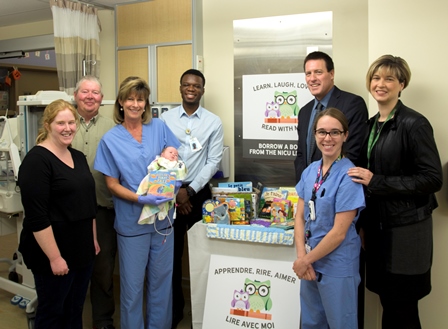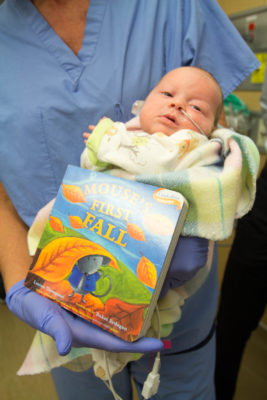
By Taylor Grant
Premature babies and their families who begin their life in the Neonatal Intensive Care Unit (NICU) can experience a great deal of stress. Depending on the specific illness or treatment, parents may not even be able to hold their new baby and this can be a barrier to bonding in those very early days. It can be a very overwhelming experience.
With that in mind, the NICU and the Service of Pediatrics at the North Bay Regional Health Centre (NBRHC) launched an innovative early childhood reading program designed to promote newborn bonding and development.
Dr. Cheryl Clayton, Service of Pediatrics, NBRHC, says when parents read to their babies while in the NICU, it has shown to help them feel closer to their baby and gain a sense of normalcy. “Families and caregivers visiting the NICU often tell me it’s hard to connect with their newborn baby and they feel alienated from providing normal parental care,” say Dr. Clayton. “We wanted to promote closeness and help parents feel like they are directly contributing to their infant’s care and development right from the start.”

The new Learn, Laugh, Love and Read with Me program in the Health Centre’s NICU gives visitors the opportunity to select a book from the lending library to read to their newborns. “Reading a book is a special one-on-one activity that can really bring infants and parents comfort,” says Dr. Clayton. “Research has shown reading to babies in the NICU can help parents develop the same feelings of intimacy that parents of healthy newborns cultivate in the days and weeks after a baby’s birth.”
Dr. Clayton explains reading to your new baby right from the start has also shown to promote early language and literacy development. “Early language skills, which are the foundation for later reading ability, are based primarily on language exposure. Children with greater exposure to language have larger expressive vocabularies,” says Dr. Clayton. “When newborn babies require treatment in the NICU, instead of human voices and noises of daily life, they hear monitors and sometimes stretches of no sound at all.”
Early experiences, especially everyday interactions with parents, shape the brain architecture that supports learning later in life. “Even though newborns don’t understand what you’re saying, being read to helps shape the brain to prepare for learning later in life and they can already pick up on rhythm, tones and emotions,” says Dr. Clayton. “Thanks to the new lending library we’re now able to offer a variety of children’s books in both official languages that are essential tools for providing caregivers with developmentally appropriate language to use with children and for facilitating baby talk, the exaggerated, sing-song speech that babies prefer.”
Taylor Grant is a Communications Assistant at North Bay Regional Health Centre.

